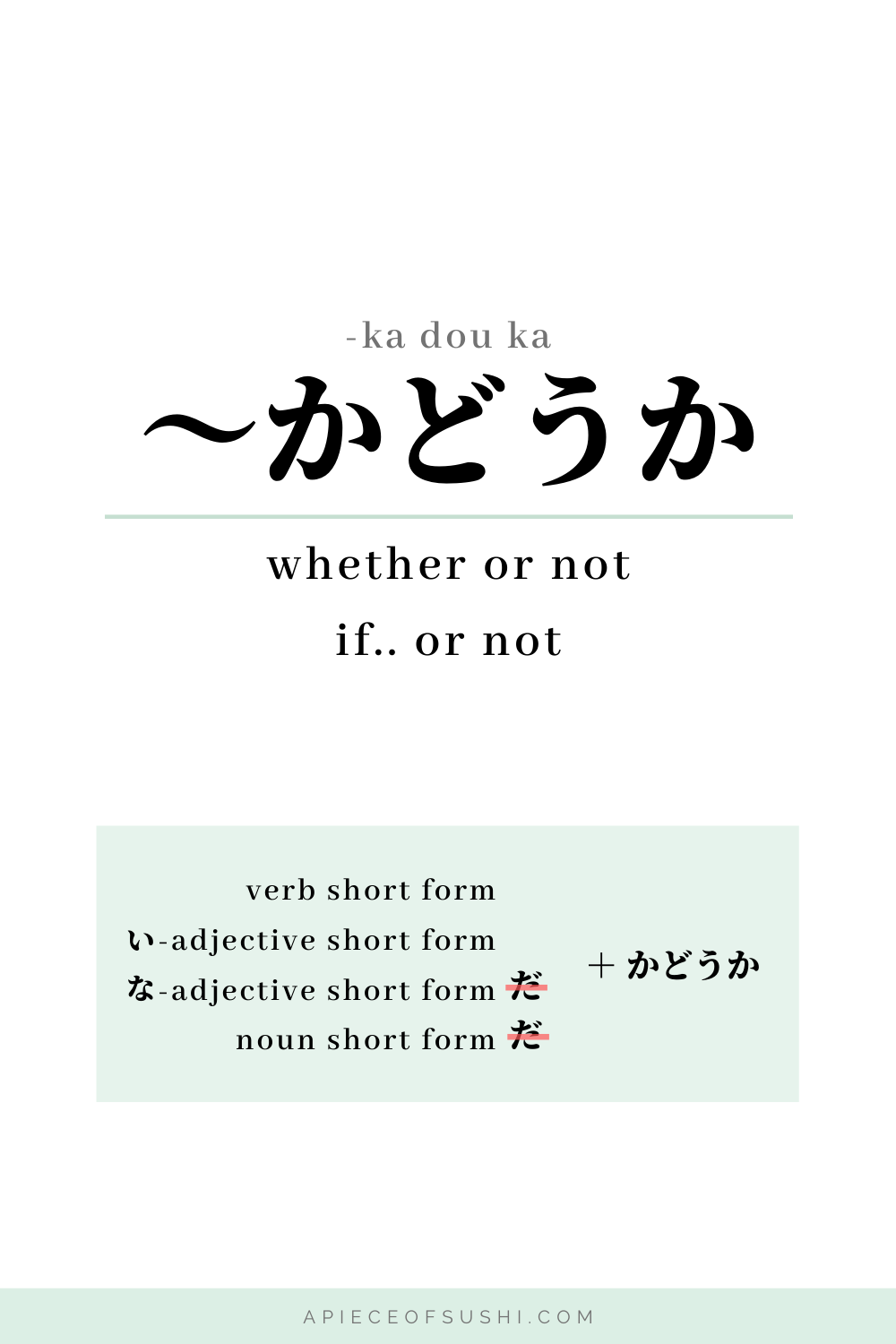Page Contents
The meaning of -ka dou ka 〜かどうか – 意味
‘whether or not’, ‘if.. or not’.
Sounds easy, yes?
How to form with -ka dou ka 〜かどうか – 接続
verb short form | ~かどうか、 |
い-adjective short form | |
な-adjective short form だ | |
noun short form だ |
Some examples – 例文
近頃の研究によると、その歴史人物は実在したかどうか不明だそうだ。
Chikagoro no kenkyuu ni yoru to, sono rekishi jinbutsu wa jitsuzai shita ka dou ka fumei da sou da.
According to recent research, it’s unknown if this historical figure ever existed.
のりこさんは毎日仕事と趣味で忙しそうですから、来週の女子会に来るかどうかわかりません。
Noriko-san wa mainichi shigoto to shumi de isogashi sou desu kara, raishuu no jyoshi-kai ni kuru ka dou ka wakarimasen.
We don’t know if Noriko-san will come to the girl’s day out next week, she seems to be so busy with her work and hobbies every day.
あの有名な中華料理店でまだ食べたことがないので、おいしいかどうか知りません。明日食べに行くんですか。おいしいといいですね。
Ano yuumei na chuuka ryouriten de mada tabeta koto ga nai node, oishii ka dou ka shirimasen. Asu tabeni ikun desu ka. Oishii to ii desu ne.
I haven’t eaten at that famous Chinese restaurant yet, so I don’t know if it’s good or not. Are you going there to eat tomorrow? I hope it’s gonna be good!
あの映画の主人公は魔法使いかどうか知っていますか。
Ano eiga no shujinkou wa mahou-tsukai ka dou ka shitte imasu ka.
Do you know if the main character in the movie is a wizard or not?
A: 人類が月に行ったかどうか信じている?
B: 見当もつかないよ。人類がまた月に行けるかどうかもわからないよ。
A: Jinrui ga tsuki ni itta ka dou ka shinjiteiru?
B: Kentou mo tsukanai yo. Jinrui ga mata tsuki ni ikeru ka dou ka mo wakaranai yo.
A: Do you believe that mankind has been to the moon?
B: I have no idea. I don’t even know if mankind can ever go again to the moon.
ギリシャが南ヨーロッパ(南欧)に位置するかどうかご存知ですか。
Girisha ga minami yooroppa(nan-ou) ni ichi suru ka dou ka go-zonji desu ka.
Do you know if Greece is located in southern Europe?
会議のための議案書が承認されたかどうか心配だ。
Kaigi no tame no giansho ga shounin sareta ka dou ka shinpai da.
I’m being worried if the proposal for the meeting was approved or not.
この生地が本当にシルク(絹)かどうか知りたい。
Kono kiji ga hontou ni shiruku(kinu) ka dou ka shiritai.
I want to know if this fabric is really silk.
この文法を皆さんが理解できたかどうか確認したいので、この文法を使って文を書いてきてください。
Kono bunpou wo minasan ga rikai dekita ka dou ka kakunin shitai no de, kono bunpou wo tsukatte bun wo kaitekite kudasai.
I’d like to make sure if you guys understand this grammar, so please go write some sentences using this grammar.
このキノコが食用かどうかわからないので食べるのをやめましょう。
Kono kinoko ga shokuyou ka dou ka wakaranai no de taberu no wo yamemashou.
We don’t know if this mushroom is edible so let’s not eat this.
新年の抱負を決めたかどうかも覚えていません。
Shinnen no houfu wo kimeta ka dou ka mo oboete imasen.
I don’t even remember if I have set a New Year’s resolution or not.
スイカ(西瓜)のカロリーが高いかどうか調べてみたらそんなに高くなかった。
Suika no karorii ga takai ka dou ka shirabete mitara, sonnani takaku nakatta.
I’ve checked if a watermelon is high in calories, it’s actually not that high.
What’s the difference between ‘-ka dou ka’ 〜かどうか and ‘(interrogative)-ka’ 〜か? – 「〜か」と「〜かどうか」の違い
I get this question a lot from my students! I have already answered this at ‘-ka’, LPT N4 Grammar. So I’m repeating here; this is a simple explanation from our beloved textbook ‘Genki’ (2nd edition, Lesson 20, page. 192)
-ka dou ka (〜かどうか) will be used with Yes / No question.
-ka(〜か) will be used with a Question-Word(what, when, where, who, which, how)
Similar grammars – 似ている文法
(interroative)-ka, 〜 か (JLPT N4)
Which chapter in ‘Genki’? – 「げんき」の何課?
– ‘Genki (2nd edition)’ Lesson 20
That’s it! Did you learn something new?😁





